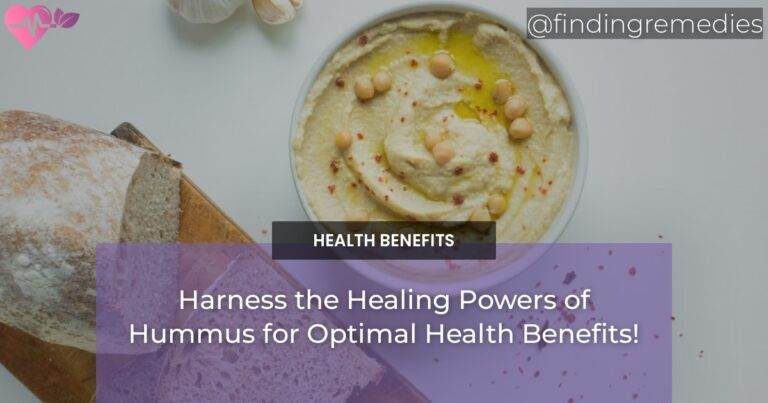Health Benefits of Hummus
Hummus is a popular Mediterranean dip made from mashed chickpeas, tahini, garlic, and lemon juice. It has gained popularity in recent years because of its delicious taste and numerous health benefits. Here, we will discuss the various benefits of hummus and its nutrition profile.
Overview of Hummus
Hummus is a staple in Middle Eastern cuisine and has become a popular snack and appetizer worldwide. It is made from chickpeas, which are also known as garbanzo beans. The beans are mashed and mixed with tahini, which is a paste made from sesame seeds, garlic, lemon juice, and other herbs and spices.
Nutrition Profile of Hummus
Macronutrients
Hummus is a great source of plant-based protein and healthy fats. A 100g serving of hummus contains the following:
- Protein – 7.9g
- Carbohydrates – 20.3g
- Fat – 15g
Micronutrients
Hummus is also rich in vitamins, minerals, and fiber. A 100g serving of hummus contains the following:
- Fiber – 6.0g
- Iron – 2.9mg
- Magnesium – 70mg
- Phosphorus – 137mg
- Potassium – 260mg
- Vitamin B6 – 0.2mg
Natural Compounds in Hummus
Hummus contains natural compounds that offer numerous health benefits.
ALSO READ
Chickpeas
Chickpeas are a good source of protein, fiber, and complex carbohydrates. They also contain antioxidants and anti-inflammatory compounds that offer numerous health benefits.
Tahini
Tahini is a good source of healthy fats and essential minerals such as magnesium, phosphorus, and potassium. It also contains plant compounds that have antioxidant and anti-inflammatory properties.
ALSO READ
Garlic
Garlic is known for its medicinal properties and has been used for centuries to treat various ailments. It contains sulfur compounds that have been shown to improve heart health, reduce inflammation, and boost the immune system.
Lemon Juice
Lemon juice is a good source of vitamin C, which is an antioxidant that helps protect the body from free radicals. It also helps improve digestion and boosts the immune system.
Health Benefits of Hummus
Cardioprotective Effects
Hummus contains plant-based protein, healthy fats, and fiber, which are all beneficial for heart health. Studies have shown that consuming chickpeas and other legumes can help lower cholesterol levels and reduce the risk of heart disease.
Improved Digestive Health
Hummus is a good source of fiber, which is important for digestive health. Fiber helps promote regular bowel movements and can help prevent constipation.
Blood Sugar Control
Chickpeas have a low glycemic index, which means they don’t cause a rapid spike in blood sugar levels. This makes hummus a good snack option for people with diabetes or those looking to control their blood sugar levels.
Anti-inflammatory Properties
Hummus contains anti-inflammatory compounds such as omega-3 fatty acids and polyphenols, which can help reduce inflammation in the body. Chronic inflammation has been linked to numerous health problems, including heart disease, cancer, and arthritis.
Improved Bone Health
Hummus is a good source of calcium, magnesium, and phosphorus, which are essential minerals for bone health. Consuming hummus regularly can help improve bone density and reduce the risk of osteoporosis.
Potential Anti-cancer Effects
Chickpeas contain plant compounds such as saponins and lignans that have been shown to have anti-cancer properties. Regular consumption of chickpeas and hummus may help reduce the risk of certain types of cancer, including colon and breast cancer.
Boosts Immune System
Hummus contains nutrients such as vitamin C, iron, and zinc, which are important for immune system function. It also contains anti-inflammatory compounds that can help reduce the risk of infections and other illnesses.
Effects of Cooking and Proper Storage
Cooking Methods
Hummus is usually served raw, but it can be cooked as well. Boiling chickpeas before mashing them can improve their digestibility and nutrient absorption.
Storage Tips
Hummus should be stored in an airtight container in the refrigerator. It can last for up to a week if stored properly.
Varieties and Types of Hummus
Hummus is available in various flavors and types, including roasted red pepper, garlic, and avocado. It can also be made with different types of beans or legumes, such as black beans, lentils, or edamame.
Disadvantages and Advantages of Hummus
While hummus offers numerous health benefits, it is also high in calories and fat. However, the fat in hummus comes from healthy sources such as tahini and olive oil.
Conclusion
Hummus is a delicious and nutritious dip that offers numerous health benefits. It is a great snack option for those looking to improve their heart health, digestive health, and immune system function. Hummus is also versatile and can be enjoyed in various flavors and types.

